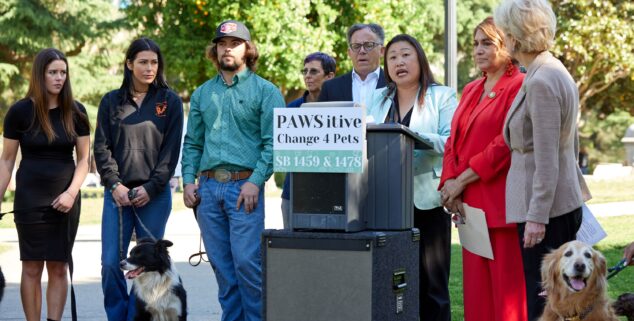News
Senate committee goes to the dogs…and cats
 Sen. Janet Nguyen, Sen. Josh Newman, Sen. Rosilicie Ochoa Bogh, and Assemblymember Sharon Quirk-Silva. Photo by Senate Republicans.
Sen. Janet Nguyen, Sen. Josh Newman, Sen. Rosilicie Ochoa Bogh, and Assemblymember Sharon Quirk-Silva. Photo by Senate Republicans. A trio of bills aimed at improving care for animals at shelters cleared the Senate Committee on Business, Professions and Economic Development on Monday.
The trio of bills collectively aim at reducing shelter overcrowding and improving record keeping around animal care while requiring more shelters to publicly report data on a variety of care issues, including the number of animals euthanized.
“Animals have no voice. So we are their voice,” Senator Janet Nguyen (R-Huntington Beach) said in a press release after the committee endorsed the measures. “California needs to be at the forefront of animal welfare and treat dogs, cats and other creatures in our shelters with care and dignity. I don’t want to hear any more anecdotes on animal abuse in shelters funded by taxpayers.”
Nguyen was the primary author on two of the measures:
SB 1478, which urges veterinarians to make specific notations on animal medical charts outlining necessary care for that animal, including treatment intervals and protocols for controlling acute pain and injuries;
and
SB 1459, which requires shelters in large counties to post certain monthly data on their websites, including the facility’s number of animal intakes and adoptions. It would also require noting how many animals died, along with a breakdown of how many were natural deaths and how may were from euthanasia. The measure also clarifies that programs which trap, neuter and return feral or abandoned cats to the environment they were taken from is legal and does not constitute criminal animal abandonment.
At a press conference prior to the committee meeting, Nguyen recounted her frustration at previously being unable to get that kind of data from shelters, saying “Surely they know the numbers, so what are they hiding?”
Nguyen said that publicly posting this data will “hold the shelters accountable” by showing the differences between counties and creating pressure for them to improve care and reduce the number of sick or injured animals put down each year.
Both measures were co-authored by Sen. Josh Newman (D-Fullerton) and Assemblymembers Diane Dixon (R-Newport Beach); Laurie Davies (R-Laguna Niguel); Heath Flora (R-Ripon); Kate Sanchez (R-Rancho Santa Margarita); and Sharon Quirk-Silva (D-Fullerton).
The third measure, SB 1233, authored by Sen. Scott Wilk (R-Santa Clarita), seeks to mitigate the often-onerous cost of providing spay/neuter services by allowing two lauded California schools of veterinary medicine – the University of California Davis and Western University of Health Sciences in Pomona – to create a first-in-the-nation High-Quality High-Volume Spay/Neuter (HQHVSN) certification program. HQHVSN is a minimally invasive surgical technique that allows veterinarians to perform large numbers of spay and neuter procedures at low or no-cost.
Wilk’s office cited a 2021 UC Davis study that said many shelters around the state struggle to find a veterinarian that can perform the procedure, leaving as many as 150,00 dogs and cats each year without needed spay/neuter services. Many of those animals end up in shelters, where they are eventually euthanized.
“Overcrowding at California’s animal shelters, especially in the High Desert, has been at crisis levels for too long. Animals are being put down through no fault of their own, and we have a responsibility to do something about it,” Wilk said in a statement. “Creating a larger pool of veterinarians qualified to perform faster spay/neuter services will alleviate shelters, stop unnecessary deaths, and make it easier to find loving homes for pets in need.”
All three bills move now to the Senate Appropriations Committee.
Want to see more stories like this? Sign up for The Roundup, the free daily newsletter about California politics from the editors of Capitol Weekly. Stay up to date on the news you need to know.
Sign up below, then look for a confirmation email in your inbox.

Leave a Reply